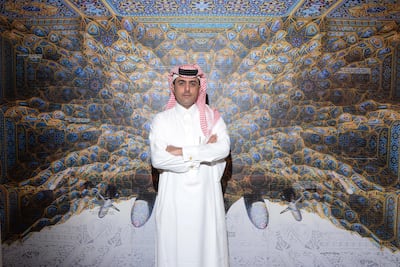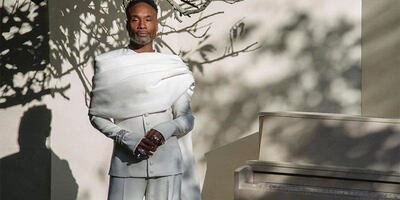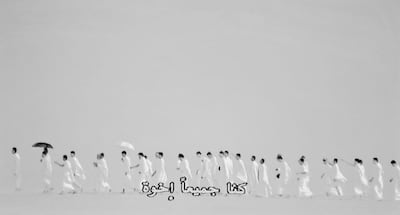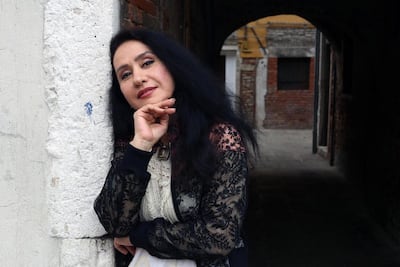Happy birthday Saudi Arabia. As the kingdom marks the 90th anniversary of its founding on September 23, we survey some of the movers and shakers of its cultural scene.
Below are 23 creatives, presented alphabetically, who are blazing a path forward for future generations of Saudi Arabians. From literature and music to fashion and vlogging, there's a female novelist who won the prestigious International Prize for Arabic Fiction, architect brothers who presented their work at the Venice Biennale, directors of award-winning films and a social media vlogger who uses YouTube to change perceptions of the region.
1. Abadia by Shahd AlShehail
Founded by Saudi entrepreneur Shahd AlShehail, Abadia mixes directional modestwear with the handiwork of regional artisans. Drawing on the skill of more than 40 women from across the kingdom, Abadia pieces come edged with traditional elements, including discreet beading and sadu weaving. Scattered on distinctly new shapes, these traditions are shown to a wider audience, helping ensure their survival. The label's name too draws on the desire to embrace tradition, and is a blend of the Arabic words for desert (badiah) and timeless (abadi).
2. Abdulnasser Gharem

A former lieutenant colonel in the Saudi Arabian army, Abdulnasser Gharem incorporates military imagery in his paintings that are constructed out of rubber stamps. These visuals tap into ideas of war, nationhood and contemporary socio-political issues that are particularly relevant to his native country. Born in 1973, Gharem has also founded a studio in Riyadh as a place for young artists to experiment and create. His works have been shown at the Sharjah Biennial, Contemporary Istanbul and Venice Biennale.
3. Abdulrahman and Turki Gazzaz
The brothers Abdulrahman and Turki Gazzaz run the architecture practice Bricklab from their base in Jeddah. The enterprise sits on the crossroads between art, architecture, and discourse – a mix that typifies young Saudi culture, and which the brothers have been instrumental in helping develop.
In 2017, for example, Abdulrahman Gazzaz co-hosted RAWTalks with Ahmed Mater at the latter's now legendary Pharan Studios, bringing in key thinkers around the idea of civic society. The pair represented Saudi in its first participation at the Venice architecture biennale, with their platform Spaces in Between, which considered how urban architecture facilitates – or inhibits – social interaction.
All eyes are on their next project, a cinema for Hayy: Creative Hub, Art Jameel’s new arts complex in Jeddah that is slated to open in 2021.
4. Ahmad Saleh
The Saudi director won the gold medal for his animated short Ayny at the 2016 Student Academy Awards. The film tells the story of two boys who dream of playing music in a war zone. In 2020, Saleh was invited to become a member of the Academy of Motion Picture Arts and Sciences.
5. Anas Alhumaid
Anas Alhumaid is a young up-and-coming filmmaker who gained regional attention earlier this month after he won the Golden Palm for Best Student Film at the sixth Saudi Film Festival. His short film, Oudah, a road-trip film, tells a contemporary Saudi Arabian story. The film was also nominated to appear at this year's Cannes Film Festival.
"Around March, we heard back from them, saying we had been nominated. And though the festival was cancelled, it was still encouraging to know where we can reach if we put in the effort. I felt like we broke a large barrier," the 23 year-old filmmaker said in an interview with The National.
6. Ashi Studio by Mohammed Ashi
One of Saudi's most famous exports is Ashi Studio, now based in Beirut and founded by Saudi designer Mohammed Ashi. Beloved by fashionable women, celebrities and red carpets watchers alike, Ashi is a byword for unapologetic glamour, steeped in the best handwork that Beirut can offer. A regular at star-studded events, this glittering label combines ultra-femininity with architectural shapes, and boldly pushes boundaries and challenges norms. For her Black is King film, Beyoncé donned a black feathered Ashi look, while at the most recent virtual Emmy Awards, it dressed actor Billy Porter in a white silk crepe trouser suit with a long, draped sash.
7. Ayman Yossri Daydban
The Palestinian-born artist Ayman Yossri Daydban is one of the elders of the Jeddah art scene, with a commitment to art that is seen in the complexity of his videos, sculptures and photo-based works. His studio in Jeddah is nearly an artwork in itself, with walls and ceilings lined with curios he picked up while traveling, as well as his own artworks. In one of his best known series, Maharem, he overlays tissue box covers – a ubiquitous item in Arab households – with posters and imagery from Arab cinema: a commentary on translation, exchange, and identity across the region.
8. Dana Awartani

Jeddah-born Dana Awartani specialises in geometric forms and utilises a variety of materials, including painting, video and textiles. She often explores traditional modes of craft-making and artisanal techniques, and then re-purposes them in contemporary and artistic ways. In her work Listen to My Words, for example, the 33-year-old artist created an installation of hand-embroidered screens modelled after mashrabiyas to critique how these architectural elements were used to obscure women in Middle Eastern societies from view. Last year, she was selected for the Al Burda endowment programme and her works were shown at Abu Dhabi Art.
9. Fatima Al Banawi
The Saudi actress and performer enjoys a diverse portfolio. However, she received international recognition when she starred in Mahmoud Sabbagh's romantic comedy film Barakah Meets Barakah, which was Saudi Arabia's submission to the Oscars. Most recently, AlBanawi starred in the Shahid Original series called Al Shak, a mini-series that was shot and produced during the coronavirus pandemic.
10. Godus Brothers
Faris and Suhaib Godus, known as the Godus brothers, came to fame through their work in projects such as Telfaz 11, their short film Depressing Scene (2016) and the Saudi Ramadan TV series Another Planet. Their film Shams al-Maaref (The Book of Sun) was one of two to receive a $500,000 (Dh1.8 million) production grant from the Tamheed Fund, a one-time award for emerging Saudi filmmakers.
The film was supposed to open the Red Sea International Film Festival in March this year, but that was later cancelled due to the coronavirus pandemic. The film had a theatrical release in September.
11. Haifa Al Mansour
Haifa Al Mansour is a trailblazer in the Saudi Arabian cinematic scene. Considered the first female Saudi filmmaker, her 2012 film Wadjda was the first feature film to be shot entirely inside the country. She has directed a number of English-language films, such as the 2017 biopic Mary Shelley and the 2018 romantic comedy Nappily Ever After.
Her latest film, The Perfect Candidate, which premiered at the Venice Film Festival last year, captures a society in transformation by telling the story of Miriam, a female Saudi doctor who challenges the patriarchal system by running for municipal office in order to fix the road leading up to her clinic.
"Saudi has a lot of stories to tell," Al Mansour said in an online Q&A held by the Arab British Centre earlier this year, adding that filmmaking in the kingdom is still an industry finding its roots, but that the opening of cinemas and film production will see things progress.
12. Hassan Dennaoui
Long before hip-hop took over the charts, Hassan "Big Hass" Dennaoui was championing the art form across the kingdom. Over 10 years, he changed the course of underground music in the region by hosting Laish Hip-hop, Saudi Arabia's first hip-hop show on FM radio.
In the process, he provided a rare platform for Saudi Arabian rappers and producers to showcase their sonic and lyrical flair. Amid the pandemic, Dennaoui has still managed to unearth new talent from the kingdom by hosting an online music festival dedicated to Saudi female artists.
The headliners included Jeddah RnB singer Sarah Chafei and Los Angeles soul singer Tamtam. Dennaoui says his door is always open to help fellow Saudi artists achieve their dreams, providing they are serious about their craft. “My job is to support local talent,” he said. “I don’t care about how many followers you have – I care about how much talent you have.”
13. Hindamme by Mohammed Khoja

This unisex brand by Saudi's Mohammed Khoja takes its name from an old expression meaning "to possess perfect form in harmony and aesthetic". Drawing on Middle Eastern heritage and global know-how, it derives inspiration from notable events, such as Saudi women being allowed to drive executed as a jacket embroidered with the date of June 24, 2018, which is now part of the permanent collection of London’s Victoria and Albert Museum. There is also an entire collection based around the architecture and inscriptions of the ancient Nabatean city of Al Ula.
14. Hissa Hilal
Hissa Hilal burst onto the scene following her blistering poetry performance on Million's Poet, a live pan-Arab poetry competition presented in American Idol format.
The 15-verse work, The Chaos of Fatwas, delivered in the rhythmic Nabati form favoured by Bedouins, criticised hard-line clerics for "terrorising people and preying on everyone seeking peace". In an interview with The National, the Saudi poet said that her work caused controversy long before her television appearance. The cameras merely gave her a wider reach.
"My issues, my thoughts, these topics I speak about; I have always been like this," she said. "If you speak to my friends and colleagues they will tell you the Hissa you see on television is the Hissa they knew for 20 years." Prior to her appearance on Million's Poet, Hilal published two collections of poetry, both under the pseudonym 'Remia'. She began releasing works under her real name after her televised performance.
In 2010, she edited and published Divorce and Kholu' Poetry: A Reading of the Status of Women in Tribal Society and Nabati Poetry as a Witness, a collection of poems written before 1950 by Bedouin women. In 2011, she published her collection, Enlightenment.
15. Majed Alesa
An enigmatic music producer and director, Majed Alesa's tracks are often viral events due to his pioneering approach to both sight and sound. Like a Hassan Hajjaj painting, his music videos burst with colour, psychedelic imagery and quirky commentary on Saudi society. When it comes to the music, Alesa mixes traditional folk vocals and compositions with slick and rhythmic production.
An example of how it all brilliantly comes together is the 2017 release Hwages (which loosely translates to concerns). The music video features a group of niqab-clad women skateboarding, playing basketball and driving bumper cars, the witty and biting lyrics declaring "may all men sink into oblivion."
16. Malik Nejer
Malik Nejer has cemented his name as one of the kingdom's top cartoonists and is best known as the director of the hit animated series Masameer and Masameer: The Movie.
The young Saudi director was studying law before he decided to drop out of university and pursue his passion for cartoons. In 2009, he was working for an advertisement agency when a flood hit Jeddah, killing more than 120 people. Nejer, who was already posting short animated videos on his mostly-unknown YouTube account at the time, made a cartoon that chastised the corruption that was at the root of the disaster.
"I uploaded that video at 4am in the morning and went to sleep," Nejer said in a 2010 interview with The National. "Next day when I woke up, it was all over the place. It just went viral in a couple of hours." In 2014, Nejer founded Myrkott with Abdulaziz Al-Muzaini and Faisal AlAmaer. The studio's founders are known to be the force behind the popular satirical cartoon Masameer. Earlier this month, the studio signed a five-year deal with Netflix to produce new seasons of Masameer, as well as a range of Masameer films for the streaming platform.
17. Manal AlDowayan

Raised in Saudi Arabia's eastern province of Dharan, Manal AlDowayan, 46, has become one of the country's most significant artists. Her work Suspended Together from 2011 is part of Barjeel Art Foundation's collection. It features two porcelain dove sculptures inscribed with texts from permission papers that Saudi women were required to obtain from male guardians for travel. More recently, AlDowayan presented her ambitious project Now You See Me, Now You Don't at this year's Desert X in Al Ula, a heritage site in the kingdom's northwestern region. The installation featured 12 trampolines fitted into the valley grounds for visitors to interact with.
18. Mohamed Moshaya
Meet one of the Arab world's favourite dads. For nine years, Mohamed Moshaya has been charming the region with YouTube videos showcasing his deep and zany bond with his four young children. As a result, his channel has amassed nearly 17 million subscribers, currently making it the second leading YouTube channel in the Arab world.
But his path to success is not simply down to some slick production and “aww” moments. Moshaya's content has broken stereotypes, inspiring fellow Saudi dads to show their lighter side. “I get messages sometimes from people who have said that after their husbands started watching our videos, they have been going out more as a family because that’s what we do,” he said. “The fact that our content is making people more loving is really special to me.”
19. Mohammad Al Faraj
Among Saudi artists, as with young artists everywhere, climate catastrophe has emerged as a major subject. In his impressive debut solo show this part March, Mohammad Alfaraj addressed the subject from a range of angles: from the political and economic factors that have stymied a workable response to a sensorial evocation of the ill and rotting natural world. Most effective was his use of nostalgia: though only born in 1993, he framed his own childhood, amidst the palm trees of the Eastern Province, as already a world long lost.
20. Nour Sufyani
The global press may have hailed her as Saudi Arabia's first female DJ, but Jeddah's Nouf Sufyani just wants to focus on playing the next record. Performing under the name Cosmicat, she made waves in the EDM industry after her slamming 2019 set in front of 50,000 people at Riyadh's MDL Beast Festival.
That star turn has made Sufyani in demand both on and off the decks. She is planning to provide DJ classes to fellow Saudi women. "Since I performed I got so many emails from people who wanted to speak about my career," she said. "They asked me how I got into the industry and what kind of equipment I use. That's really cool."
21. Raja Alem
As the first Saudi female to win to the International Prize for Arabic Fiction in 2011, the Makkah-born novelist has been at the forefront of showcasing the kingdom's literary scene to an international audience. Her award winning work, The Dove's Necklace received wide acclaim upon its 2016 English translation, some dubbing Alem's evocative style as similar to Russian great Vladimir Nabokov.
A story filled with fierce women, Alem described her work as a commentary on how a customs-heavy Saudi Arabian society is grappling with constant change. "The women in the book were strong elements of change,” she said. “They were by no means passive, but fought their own battles to be themselves. They paid the price – but isn’t life about that? Making choices and paying for them?”
22. Sarah Abu Abdallah
Nothing is more welcome in art than a sense of humour. Saudi artist Sarah Abu Abdallah’s investigations into daily life – lived in houses and on highways, as well as online – are masters of sly observation. In one early video, which characteristically draws on diaristic forms, her camera is distracted by an interloper into the family home: a cockroach as it glides across the floor and under and beyond the couch, as if it owns the place.
With relatability, her work pays particular attention to emotional states, such as the anxiety that surrounds a life online, or the movement away from the natural land as urbanisation continues.
23. Sawsan Al Bahiti
Touted as Saudi Arabia's first soprano, Sawsan Al Bahiti has been charting a course with performances both at home and abroad. A trained opera singer for 12 years, her repertoire includes pieces in Italian, German, French and English. From Chopin's In Mir Klingt Ein Lied to Broadway classics, Al Bahiti is building a strong career as a performer.
"What a beautiful thing to be able to go above the clouds and fly just by your voice and your feelings," she said in her Instagram after a Jeddah performance last October. "I work on myself to become better at it every day so I can take you with me on that journey through my voice."









